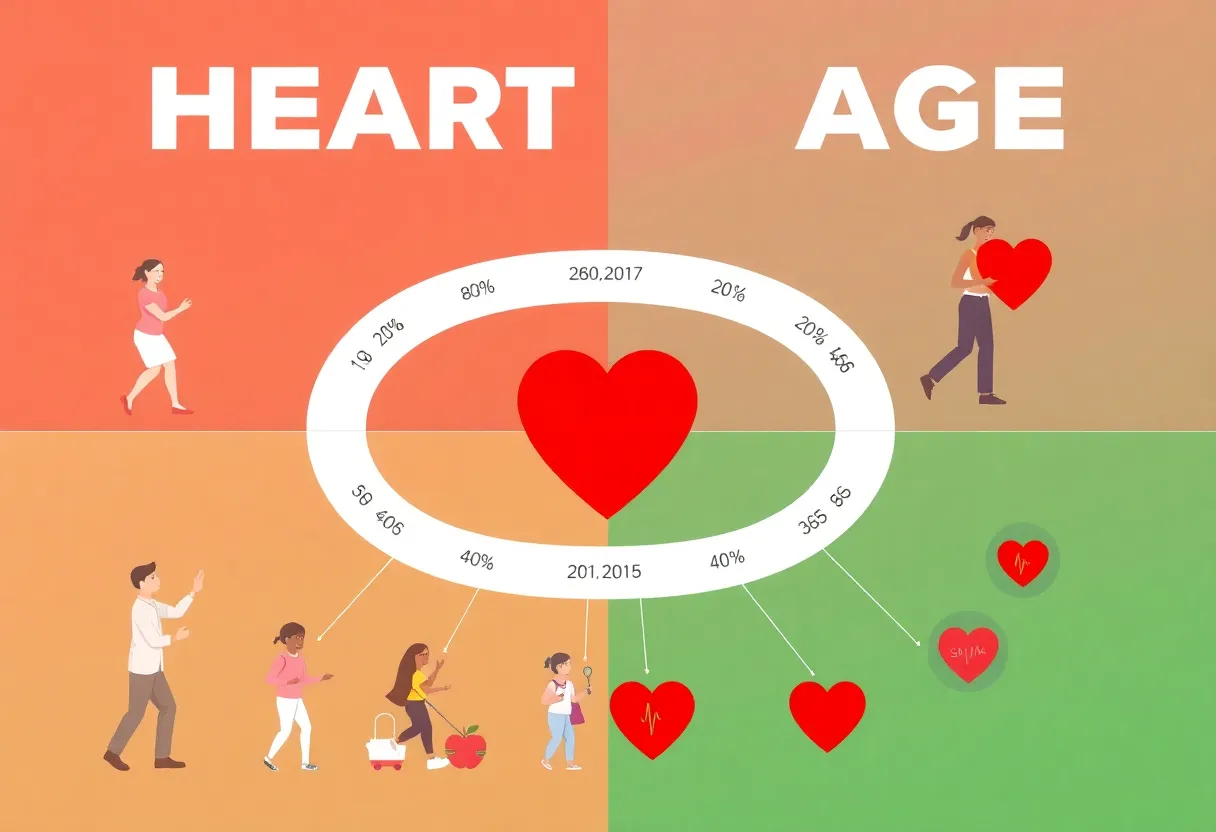Chicago, IL, July 31, 2025
News Summary
A new study by Northwestern Medicine reveals that many U.S. adults have a ‘heart age’ significantly older than their chronological age, particularly among demographic groups such as men, lower-income individuals, and minorities. The findings highlight the urgent need for preventive care and understanding of cardiovascular health risks. A free online calculator to assess heart age has also been introduced. These insights aim to facilitate better communication between patients and healthcare providers regarding heart health.
Chicago, IL – A significant new study conducted by Northwestern Medicine uncovers alarming information about heart health among adults in the United States. The research indicates that many U.S. adults have a “heart age” that is several years older than their actual chronological age, with some discrepancies exceeding ten years. This finding is especially concerning given that heart disease continues to be the leading cause of death in the U.S.
The study highlights marked disparities in heart age based on demographics. Researchers found that men, individuals with lower incomes, those with lower education levels, and adults who identify as Black or Hispanic often experience the largest gaps between their chronological and heart ages. For instance, Black men have an average heart age 8.5 years older than their actual age, while Hispanic men average 7.9 years older.
To aid individuals in understanding their cardiovascular health risk, Northwestern scientists have developed a free online calculator. This tool assesses a person’s “heart age” based on various risk factors linked to cardiovascular disease, including blood pressure, cholesterol levels, smoking status, and diabetes history. It is important to note that this calculator should not be a substitute for medical care; individuals are encouraged to use it alongside consultations with healthcare professionals.
The findings of this study are set to be published in the Journal of the American Medical Association (JAMA) Cardiology on July 30, 2025. With traditional measures of heart disease risk expressed as percentages, the study’s authors argue that framing the risk in terms of age may be more digestible for patients, which could, in turn, enhance discussions between healthcare providers and patients regarding heart health.
The study evaluated data from over 14,000 U.S. adults between the ages of 30 and 79, using information gleaned from the National Health and Nutrition Examination Survey conducted between 2011 and 2020. Notably, the analysis revealed that women have an average heart age of 55.4 years compared to a chronological age of 51.3 years, while men have a heart age of 56.7 years versus 49.7 years.
For individuals with lower education levels, particularly men, the impact is severe. Approximately one-third of men with a high school education or less have a heart age that is more than ten years older than their actual age. Additionally, data shows that Black women average 6.2 years older in heart age than their chronological age, while Hispanic women have a gap of 4.8 years. Comparatively, white men show a heart age that is 6.4 years older, and white women an average of 3.7 years, with Asian men and women averaging 6.7 years and 2.8 years older, respectively.
The study reiterates that despite advancements in public health, many adults remain without necessary preventive care for heart disease. The heart age calculator aims to motivate individuals, particularly younger generations, to acknowledge their risk for heart disease and consider preventive strategies.
Looking forward, the researchers intend to investigate whether presenting cardiovascular risk as heart age can enhance medical outcomes and patient understanding of preventive therapies.
Frequently Asked Questions
What is “heart age”?
Heart age is a measure that indicates a person’s risk for cardiovascular disease, calculated based on various health factors, including blood pressure, cholesterol, and lifestyle habits.
How can I find out my heart age?
You can calculate your heart age using a free online tool developed by Northwestern Medicine that assesses multiple cardiovascular risk factors.
Is the heart age calculator a replacement for medical advice?
No, the heart age calculator is not a substitute for clinical care. It should be used as a supplementary tool alongside consultations with healthcare professionals.
What demographic factors influence heart age?
Heart age can be influenced by factors such as gender, education level, income, and race; disparities exist among different demographic groups.
Key Findings
| Demographic Group | Average Heart Age vs. Chronological Age |
|---|---|
| Women | Average heart age: 55.4 years; Chronological age: 51.3 years |
| Men | Average heart age: 56.7 years; Chronological age: 49.7 years |
| Black Men | Heart age is 8.5 years older |
| Black Women | Heart age is 6.2 years older |
| Hispanic Men | Heart age is 7.9 years older |
| Hispanic Women | Heart age is 4.8 years older |
| White Men | Heart age is 6.4 years older |
| White Women | Heart age is 3.7 years older |
| Asian Men | Heart age is 6.7 years older |
| Asian Women | Heart age is 2.8 years older |
Deeper Dive: News & Info About This Topic
HERE Resources
Billy Joel Cancels Concerts Due to Health Issues
Conroe ISD Revises Student Pronoun Policy Amid New Texas Law
Flow Yoga Opens New Studio on South Congress Avenue
LiftFund Supports Central Texas Small Businesses After Floods
Texas Hill Country Devastated by Flooding
Tragic Accident in Galena Park: Child Left in Hot Car
The Great THC Debate Heats Up in Texas
Tragic Murder-Suicide Claims Three Lives in Katy
Texas Business Community on Edge Over Senate Bill 3
Concerns Rise Over xAI’s Controversial Supercomputer Facility
Additional Resources
- The Washington Post: Heart Biological Age and Cardiovascular Disease
- STAT: Most Americans’ Hearts Older than Chronological Age
- Medical Xpress: Adults’ Hearts Older than Actual Age
- Today: Heart Age Study and Calculator
- BuzzFeed: Heart Cardiovascular Age
- Wikipedia: Heart Disease
- Google Search: Cardiovascular Disease
- Google Scholar: Heart Age Calculator
- Encyclopedia Britannica: Heart
- Google News: Heart Disease
Author: STAFF HERE HOUSTON TX WRITER
The HOUSTON STAFF WRITER represents the experienced team at HEREHouston.com, your go-to source for actionable local news and information in Houston, Harris County, and beyond. Specializing in "news you can use," we cover essential topics like product reviews for personal and business needs, local business directories, politics, real estate trends, neighborhood insights, and state news affecting the area—with deep expertise drawn from years of dedicated reporting and strong community input, including local press releases and business updates. We deliver top reporting on high-value events such as Houston Livestock Show and Rodeo, Art Car Parade, and Chevron Houston Marathon. Our coverage extends to key organizations like the Greater Houston Partnership and Houston Area Urban League, plus leading businesses in energy and healthcare that power the local economy such as ExxonMobil, Schlumberger, and Houston Methodist. As part of the broader HERE network, including HEREAustinTX.com, HERECollegeStation.com, HEREDallas.com, and HERESanAntonio.com, we provide comprehensive, credible insights into Texas's dynamic landscape.





